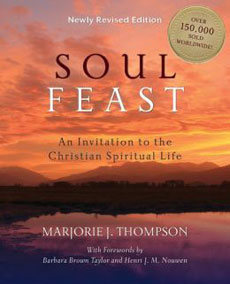Marjorie J. Thompson, an ordained Presbyterian minister, is the Director of Pathways Center for Spiritual Leadership at Upper Room Ministries. In this new edition of a book first published in 1995, she lays out the essentials of spiritual practice for Christians. Thompson defines spirituality as "the universal capacity to receive, reflect, and respond to the Spirit of God. . . . It points to the choices of belief, value, commitments, patterns of life, and practice of faith that allow Christ to be formed in us." This edifying paperback is divided into chapters on spiritual reading, prayer, common worship, fasting, self-examination, spiritual direction, hospitality, and developing a rule for life. There is a nine-page group Study Guide at the end of the book.
One of the best things about this invitation to the Christian spiritual life is the smorgasbord of soulful quotations scattered throughout the text. Here's one by Dietrich Bonhoeffer on spiritual reading:
"The Word of Scripture should never stop sounding in your ears and working in you all day long, just like the words of someone you love. And just as you do not analyze the words of someone you love, but accept them as they are said to you, accept the Word of Scripture and ponder it in your heart, as Mary did. That is all. That is meditation. . . . Do not ask 'How shall I pass this on?' but 'What does it say to me?' Then ponder this Word long in your heart until it has gone right into you and taken possession of you."
Here's another gem that spruces up the oftentimes pedantic subject of worship:
"Christian philosopher Soren Kierkegaard developed an analogy called 'the theater of worship.' It invites us to see public worship as a kind of theater experience, and asks us to identify the stage, actors, and audience. Based on our experience of worship, most of us would probably locate the stage in the church chancel and see worship leaders as the actors performing for a congregational audience. But Kierkegaard asks us to see the sanctuary as a stage on which the entire congregation acts, prompted by ministers and musicians. The audience is God!"
Church members who study this work will want to spend extra time on the chapters on fasting (see how it relates to social issues), hospitality (see how it has relevance to immigration and other hot button issues of the day), and establishing a rule of life. We were especially intrigued with the rule used by Dr. Martin Luther King to guide the nonviolent protests of the civil rights movement. As you ponder these ethical precepts keep in mind how timely they still are:
"Meditate daily on the teachings and life of Jesus.
Remember always that the nonviolent movement in Birmingham seeks justice and reconciliation, not victory.
Walk and talk in the manner of love, for God is love.
Pray daily to be used by God in order that all might be free.
Sacrifice personal wishes in order that all might be free.
Seek to perform regular service for others and the world.
Refrain from violence of fist, tongue, or heart.
Strive to be in good spiritual and bodily health.
Follow the directions of the movement and the captains of a demonstration."
